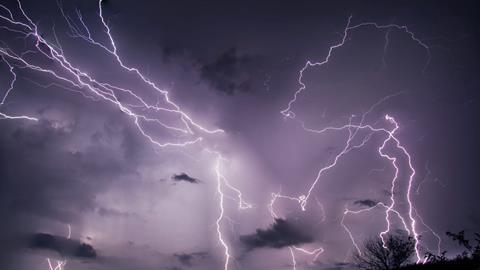Charles Clough is a retired military meteorologist who became a Christian while at MIT. Apologist Joel Furches spoke to him about being a scientist and a theologian
Charles Clough is a recently retired meteorologist who spent years working for the United States military on the Proving Grounds in Aberdeen, Maryland. His work was crucial in decision-making for the military as he produced atmospheric models and forecast predictions that might affect military actions. I recently had the opportunity to interview Clough in regard to his scientific work and also his Christian beliefs.
A child prodigy
Clough fostered a love of the sciences from a young age, particularly weather. He was still in elementary school when his father’s encouragement facilitated an interest in science that matured along with him. In high school, Clough proved his early genius by winning second place in the New York State Science Fair. His submission was a weather system he built on his own. He used his creation to generate an equation to forecast the nocturnal minimum temperature for the south shore of Long Island.
The success of Clough’s ingenious project earned him a scholarship to the Massachusetts Institute of Technology (MIT). Here, Clough eagerly pursued his lifelong interests with a major in mathematics and a minor in meteorology.
Read more:
Can a Quantum Physicist really believe in God?
Is atheism just a ‘lack of belief’ in God?
Does Big Bang cosmology point to a creator?
How a sceptical engineer discovered that science opened a way to faith
A life change
It was at MIT that Clough experienced an encounter that would change his life. It happened that one of his instructors in the Meteorology department was an outspoken Christian. This instructor fostered a friendship between himself and Clough.
The influence of this instructor was considerable on the young student, and as the two became close, Clough found his instructor’s faith to be compelling. Clough became a Christian, a decision that would strongly affect his future.
God or science?
Having participated in the US Air Force Reserve Officer Training Corps (AFROTC) program, Clough was commissioned as a 2nd Lieutenant in the US Air Force (USAF), at which point he was sent back to MIT for a year of further studies in atmospheric science. He served on active duty where he researched and published a short paper on forecasting potential wind damage to USAF radars along the Northwest coast.
But always with Clough was this drive to pursue his Christian beliefs to the fullest extent. As a man of logic and reason, he pursued this drive by leaving the military program to attend Dallas Theological Seminary. Here he earned his master of theology degree in Old Testament and semitics (ThM). For a brief period, Clough served as a pastor of a small church in a university town.
Back to weather
But Clough could not long resist the call of science. He eventually left the pastoral ministry and once again re-entered the field of atmospheric science. He pursued and obtained a master of science degree (MS) from Texas Tech University by researching a mathematical model of tropical convection.
Clough then went on to serve for 16 years in the USAF Reserve as a weather officer. He eventually retired with the rank of Lieutenant Colonel.
Simultaneously, Clough also worked full-time as a civilian scientist with the US Army at Aberdeen Proving Ground, where he founded the Atmospheric Effects Team to study weather effects on munitions, lasers and gaseous diffusion. Together with other team members, he innovated measurement systems to obtain data on the surface and aloft in coordination with modelling efforts by the National Center for Atmospheric Research. These efforts were reported in several published papers.
Get access to exclusive bonus content & updates: register & sign up to the Premier Unbelievable? newsletter!
The resolution
Clough was a scientist and a theologian who put both skills to good use. While working as a meteorologist for most of his professional life, Clough also spent a good deal of time developing his ‘Framework Series’. This is a series of talks and writings that put his degree in Old Testament theology to good use. In this series, Clough showed the development of God’s covenant throughout the Old Testament in terms of a legal agreement, and how this agreement holds up consistently, providing a framework for scripture that culminated in the coming of the Messiah. This series gained a modest amount of renown for Clough, who travelled the country giving talks on the subject.
Clough’s Old Testament theology had a significant impact on his views of science. Clough said:
“After many years’ reflection on the biblical worldview and the scientific method, I have concluded that the method depends upon assuming a cosmos identical to that of the Bible. The history of the development of science in Western civilization seems rooted in the wisdom literature of the Bible, (ie nature has a design that can be truly known by man made in God’s image to ‘name’ it) as the likely source of the sudden appearance in ancient Greece of confidence in human reasoning, in the marriage of reason and experiment among Christian students in the mediaeval period, and in the Reformation emphasis upon the so-called secular calling to subdue nature.
I see no other justification for inductive reasoning’s necessary assumption of the uniformity of nature, for deductive reasoning’s necessary assumption of immaterial ubiquitous laws of logic and classification, for the assumption of empirical thought that man’s mind can possess ideas that correspond to structures in nature, and for the necessity for honest ethics in scientific research.”
While Clough is retired, he nonetheless is very active in still championing his Framework Series, and in defending his scientific models in both the secular and the Christian communities.
Joel Furches is an apologist, journalist and researcher on conversion and deconversion, based in the USA.























